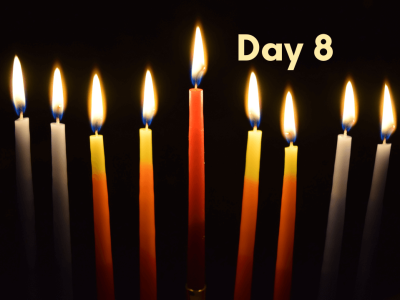Remember This! Zakar!
Remember This! Zakar!
Have you ever walked into a room and completely forgotten why? Sure you have. We all have. Forgetting things seems to be a common illness for us humans. So much so that there are countless products on the market to help improve memory. We are amazed by and jealous of those that have photographic memories. We have sticky notes, alarms, apps on our phones, and some even tie strings on their fingers, all in the attempt to remember something.

But why? Why do we go to such lengths to remember things? Why do we even care? When we think of the word “remember,” we either think of remembering to do something or remembering something that has already happened. So let’s dive into this and see where it goes.
QUESTION: Why do we seek to remember something? Give some reasons and examples.
Anniversaries, birthdays, events… We are constantly trying to remember something for one reason or another. I want to submit to you that the main reason why we humans work so hard at remembering is that our entire future depends on it. Our relationships depend on remembering. Our jobs depend on remembering. Our entire lives depend on remembering!
Dementia affects the part of the brain that is connected to memory and is one of the worst diseases known to man. At first, the victim loses some of the mental sharpness they once had. Then, they slowly begin to forget things, and sometimes they reach the point of not being able to remember their spouse or children. Watching a loved one lose their entire memory is extremely hard. As a matter of fact, without a memory, a person becomes a living invalid. They’re alive but have no purpose and no history with anyone or anything. In short, the ability to remember might be the single most important attribute we humans have. Not only does a good memory allow us to know one another, interact with one another, and have a future, but a good memory also allows us to learn from our mistakes or the mistakes of others. Without the ability to remember, we would simply make the same mistake over and over and over again. Remembering allows us to improve every area of our lives.
“And Moses said to the people: Remember this day in which you went out of Egypt, out of the house of bondage. For by strength of hand the LORD brought you out of this place. No leaven bread shall be eaten.” — Exodus 13:3
“And that you may remember and do all My commandments, and be holy for your God.” — Numbers 15:40
“And you shall remember the LORD your God, for it is He who gives you power to get wealth.” — Deuteronomy 8:18
“You shall remember that you were a slave in the land of Egypt, and the LORD your God redeemed you…” — Deuteronomy 15:15
“Remember the Sabbath day, to keep it holy.” — Exodus 20:8
“Remember what the LORD your God did to Miriam on the way when you came out of Egypt!” –Deuteronomy 24:9
“Remember the Law of Moses, My servant, which I commanded him in Horeb for all Israel, with the statutes and judgments.” –Malachi 4:4
“Having eyes, do you not see? And having ears, do you not hear? And do you not remember? –Mark 8:18
“Remember therefore from where you have fallen. Repent and do the first works, or else I will come to you quickly and remove your lampstand from its place, unless you repent.” –Revelation 2:5
As you can see from the above sampling of verses, without the ability to remember, we will become arrogant and believe we have created our own wealth, will be in violation of God’s law for breaking the Sabbath, will receive spiritual leprosy for speaking against those in spiritual authority, will not understand what Yeshua is trying to say because He is building off of previous statements and will have our lampstands removed and the presence of Yahweh depart from our midst. So there’s no question that remembering is something the Lord strongly desires of us. But the power of the word “remember” is not found in the English but in the original Hebrew. So let’s break it down and see what we can find.
The Hebrew word for “remember” is “zakar.” It’s spelled zion, kaf, resh. In the original pictograph Hebrew, zakar was very clear. The letter zion was a blade, like a knife or the blade of a plow. It cut into the earth and turned over the ground to expose what was underneath. Kaf was a picture of a bent hand, like the hand on the back of the head to anoint. And resh literally meant head or beginning. When you put all this together, you get the picture that to remember is to cut through the hard earth (of our brain) and turn something back over again so you can see what is hidden. This cutting through and turning over is what causes the Spirit to anoint our heads again so we can have a new beginning. The Father desires us to constantly be anointed by His mighty right hand. And this process requires us to “remember.” Since ancient Hebrew culture revolved around farming, zakar is connected to turning over the soil in preparation to plant. There can be no harvest without turning over and cutting through the hard earth.
Remembering the things of God – what He did, what He says, and what He asked us to do – is like a plow that cuts through the earth, turning it over and preparing a place for the seed. Luke 8:11 says that the “seed is the word of God.” When we don’t physically take the time to turn over that soil, the seed just falls on hard, parched soil which quickly washes off in the first rain storm that comes along. If we plow properly, the storms of life are able to push the seed further into the ground that has been turned over, causing it to shoot up from the ground when the storm is over and the sun comes shining through. If you do not feel like you are getting a large enough harvest in your life, it could very well be because you’re not remembering to turn over that hard soil in your life so the Spirit can plant His seeds.
We can also gain some rich insights from the regular Hebrew definition. In Hebrew, “zakar” means to mark something. Interestingly enough, the last letter in the Hebrew alphabet, tav, means “mark,” or “covenant.” This tells us that remembering is connected to the covenant. This is why there are countless times in the Bible that we are told to “remember the covenant.” The two words are actually connected. Zakar also means “to mention, to remember, to think of, to be mindful, or to record.” This definition helps us understand HOW to remember. It means that we mention the things we are to remember. We are to physically speak of them. We are also to think of the things we are to remember. They are to always be on our minds. And we are to record the things we are to remember, meaning we are to memorize the things that are critical to our future. Let’s take a look at this concept in action:
“And these words which I command you today shall be in your heart. You shall teach them diligently to your children, and shall talk of them when you sit in your house, when you walk by the way, when you lie down, and when you rise up. You shall bind them as a sign on your hand, and they shall be as frontlets between your eyes. You shall write them on the doorposts of your house and on your gates.” –Deuteronomy 6:6-9
The famous Shema above is all about the Hebrew definition of zakar. The Father is telling His children exactly how to have a great harvest in their lives. We must “mention” them all throughout the day, think about them, write them down, and do whatever it takes to remember them. He knows that we tend to forget and that means that we tend to forget Him. If we do, He has no row in which to plant seeds, and then we are left with little to no harvest.
If we look at all the words that are connected to zakar in Hebrew, those that stem from the two-letter parent root (zion, kaf), we see an even deeper meaning. Starting with Strongs #2135, “zakah” means “to be translucent, innocent, or pure” and “free from pollution.” Then we have “zekookeeth,” which means “transparent, glass, or crystal.” “Kakkay” means “pure.” “Zakak” means clean. And then we come to our word in study: “zakar,” “to remember.” Then there’s “zeekrone,” “a memorial,” and then “Zechariah,” which literally means “Yahweh has remembered.” As you can see, remember is connected to things that are pure, holy, clean, transparent, and free from pollution.
“Finally brethren, whatever things are true, whatever things are noble, whatever things are just, whatever things are pure, whatever things are lovely, whatever things are of good report, if there is any virtue and if there is anything praiseworthy, meditate on (remember) these things. The things which you learned and received and heard and saw in me, these do, and the God of peace will be with you.” –Philippians 4:8
What is Paul saying? Zakar!
There’s one more word that’s connected to zakar in Hebrew that I left out: “zakar.” That’s right, there are two different words with the exact same spelling and the exact same pronunciation, but with radically different definitions. Whereas the first zakarmeans “remember,” the second zakar literally means “a male.”
QUESTION: How on earth does “male” fit into all the other definitions of remembering? (Transparent, pure, without pollution, etc.) (HINT: Think ancient Hebrew culture. Don’t think of Greek definitions. What does the Paleo tell us again? What kind of society did they live in primarily?)
Who did all the plowing and the “turning over of the soil?” The males. Who received the inheritance from the father? The firstborn males. Who was charged with leading the families and their tribes? The males. It’s the males, the fathers, and the husbands that were commissioned to plow the fields for their families so that Yahweh could bring the increase through the powerful seeds of His Word. Although we are all commanded to remember His Word and to take part in tilling the ground, it is the males that are challenged to remember them for the sake of everyone we’re commissioned to lead. It is the husbands and fathers that are to speak of the Lord all day and to be pure and transparent, hiding nothing but exposing that which is underneath. What a genius God we serve to put the word “male” as not only connected to the word “remember” but the EXACT same word!
In the end, we need to “remember” that Hebrew words are action words. They’re concrete and have applicable meaning. In this case, the word “remember” is connected to plowing something and turning over the dirt, exposing what was hidden and making it transparent. When we diligently look into the Word of God, it turns the dirt in our lives over inside of us, exposing things that need to change. It causes us to see with clarity and, in the end, makes us pure.
If you are a man, I think the message behind zakar is that a real man remembers. He doesn’t forget. He doesn’t forget the Word but studies it and talks about it throughout the day. He doesn’t forget what sin tastes like and the pain it brings. He remembers the consequences the Father said would happen if we forget. He remembers his wife and children and the value they have to him. He takes the time to dig into the Word and into his relationship with those he loves. He marks things down and creates a serious covenant to remember.
I encourage all of you to ask yourselves, “What am I actively doing to zakar? What am I doing in my daily life to fulfill the commandment of remembering?” Perhaps you can renew a steady bible reading regimen. You could pick a verse for the day and memorize it, repeating it all throughout the day. You could post sticky notes of scriptures throughout your house. Whatever you choose to do, understand one thing. Your family’s entire harvest depends on how well you zakar!
Shalom,
Jim Staley












